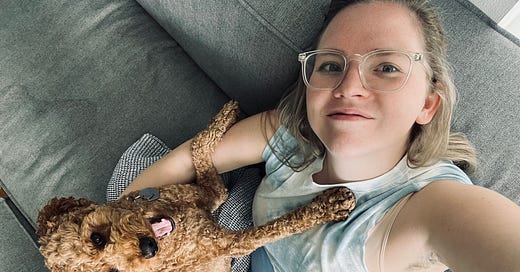“Do you even love me?”
“Why can’t you give me a fucking break?”
“Am I too fucked up for a healthy relationship?”
All you’ve ever wanted was to be loved. When you were a baby, you had to adapt to your environment to figure out how to get your needs met—before you could use language, and before you could feed or care for yourself.
Depending on the adaptations you made, you developed a primary style of attachment: secure, anxious, avoidant, or disorganized (anxious-avoidant).
If you’re lucky, you had a relatively stable environment where your needs were met consistently, and you learned that you could trust other people.
If you’re not so lucky, things got messy… and probably stayed that way. Your early adaptations evolved into complex systems of resentment, defensiveness, and shame.
Resentment is a big factor for anxiously attached people. You’re always doing a lot, trying to be super-useful, and overextending yourself. You’re trying to earn enough love—which never seems possible. And when everything you’re pouring into your people seems to drain away, instead of coming back to you, you feel cheated and overlooked.
Defensiveness is especially prominent if your attachment style is avoidant. You learned that intimacy wasn’t safe, and you had to keep yourself walled off to avoid abandonment and deep disappointment. So even when you’re not trying to be mean, there’s a part of you that’s always trying to push people away. You might get overwhelmed and shut down, withdraw, or defend yourself sharply.
Shame really takes the cake for those of us with anxious-avoidant attachment. Our early environment was so unpredictable that we learned “the problem is me!” before we could even think with words. We didn’t know when we’d be loved or when we’d be ignored, so we tried to overcompensate in all the ways. There’s a lot of perfectionism and negative self-talk in this camp, too.
The truth is, all 3 of these adaptations show up for anyone who’s insecurely attached. While you might have a go-to coping mechanism, you probably experience varying levels of resentment, defensiveness, and shame throughout your day. That’s why working with attachment wounds is so powerful! You can literally re-wire your brain to create secure attachments, and feel good in all your relationships—no matter what the other person does.
You set boundaries to stop overextending yourself, create safety to practice letting your guard down, and practice vulnerability to break the cycle of perfectionism and shame.
I’m opening up 1-on-1 coaching again to go deep into loving + healing your attachment wounds.
It’s $5k for 6 months, and if you pay in full by August 8, you’ll also get free enrollment to the in-person Embodied Vulnerability Retreat later this month in Boston.
(Or you can wait until my next retreat, which will be in Seattle in 2024! You can get that bonus by paying in full anytime in August.)
Otherwise, you can sign up for the payment plan… or keep an eye out for my upcoming group program!
There is nothing wrong with who you are or how you love. The adaptations that you made when you were a baby made total sense to keep you alive! You were literally a BABY. Do not blame the baby (you!) for the ways that resentment, defensiveness, and shame have affected your relationships.
It is possible to bloom after trauma…
And giving yourself acceptance + understanding is a huge step. Which you’re doing right now, LITERALLY just by reading this!
I’m so fucking proud of you for loving yourself so fiercely that you got yourself here, ready to step into profound healing + magic.
You are truly a delight.
Much love,
Nat (they/them)
P.S. Just want to jump into the retreat? Late registration closes August 8. I’ve got you!



